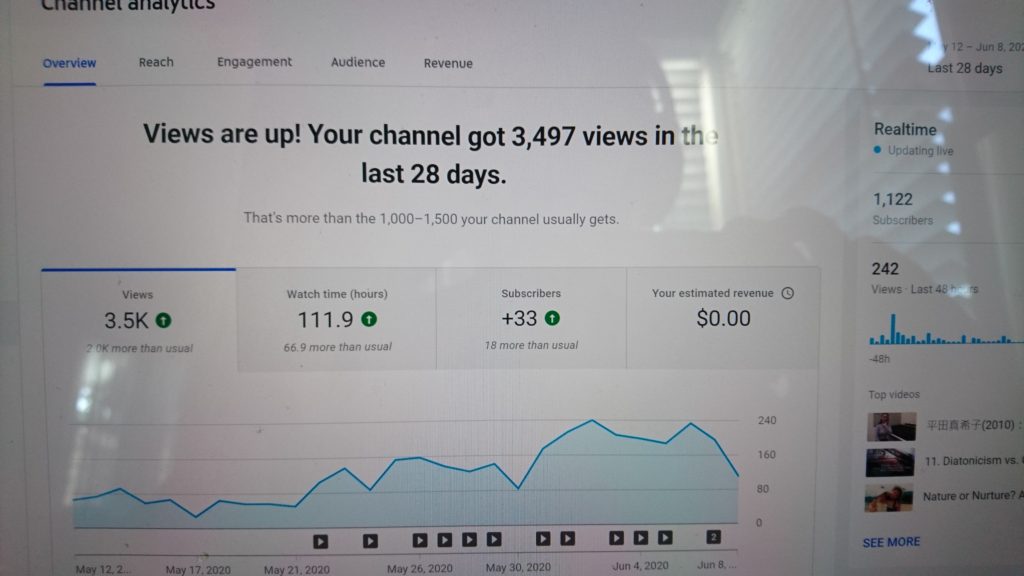I am covering this topic today, because a white friend asked me if as a woman of color I have experienced racism myself. We were discussing the BLM protests happening around the globe these days. I had to think about how to respond. “No, I have not,” I said in the phone conversation, because I felt wrong to compare my personal experience to the current protests against the systematic racism that are hostile, violent and too often fatal. However, racism, along with misogyny, sexual objectification and harassment, in the history of classical music is a topic I have been researching and writing about. I thought an offering on racism from a completely different perspective might be helpful.
Stereotype threat is a phenomenon too familiar to me and so many others. You are so afraid of confirming a negative stereotype (e.g. “Girls can’t do math,” “White men can’t jump,” etc.) that the pressure of defying the stereotype ends up undermining your ability. It happens even if you don’t subscribe to the stereotype yourself, and even if you can perform perfectly well without the pressure. It works as a self-fulfilling prophecy.
The American Psychological Association defines “Stereotype Threat” in its dictionary as
an individual’s expectation that negative stereotypes about his or her member group will adversely influence others’ judgments of his or her performance and that a poor performance will reflect badly on the member group. This expectation may undermine the individual’s actual ability to perform well. In an academic setting, for example, it has been shown that African American students’ performance in tests of intellectual ability can suffer because of anxiety induced by thinking that they are expected to perform poorly and will be judged according to negative stereotypes about Black intelligence. [identified in 1995 by U.S. psychologists Claude M. Steele (1946– ) and Joshua Aronson (1961– )]
American Psychological Association: Dictionary of Psychology, entry “Stereotype Threat”
I felt relieved when I came across the term last year, because it so perfectly captured what I was trying to describe in my my memoir, a work in progress, about my 15-year-battle with stage fright. Please watch the video below, as an example.
This live interview took place three days before my Carnegie Hall debut. I had overheard the host announcing his next guest – me – as a “little Geisha girl in the studio here with us tonight” before the commercial break.
“That small, young woman at the BIG piano…” is how he introduces me before he turns to me to start the interview. I am 5’6″ – pretty tall for an Asian female, and not “small” by any means. His questions start with “Are you nervous?” then continues to “Do you get butterflies before you perform? How do you handle that?” “Do you ever goof up?” “Have you ever stopped in the middle of a performance and apologize to the audience?” And he keeps wanting me to talk about my childhood. He was within the boundaries of his prescribed role as a host. I wonder if I even consciously caught onto how demeaning his questions were at the time.
For the record, I played close to the best of my ability at my Carnegie Hall debut, receiving a standing ovation. However, the six-minute interview is just an example of our reality day in and day out – the cumulative effect is significant.
The problem is not with Mr. Leonard or any other individual, but that it’s everyone, including yourself after a while. I do not hold grudges against remarks made by too many about my exotic “otherness,” small size and/or youth (even now!) and presumptions of my fears, insecurities, ignorance and innocence. All I want to do is to point out to the vicious circle that stereotyping can have on various groups of people, even if the stereotype itself is not inherently hostile or even negative. In my case, it manifested itself in a debilitating stage fright that started with my European debut with a Hungarian orchestra. I did “goof up,” stop in the middle of the second movement, went to the conductor and apologized, telling him I could not go on. From there, I started my fifteen-year battle with the utter fear of performing, which I eventually conquered.
Just to give another example, to demonstrate how pervasive these racial/gender stereotypes are even if they were well-meaning, I quote a review I received on my performance of Chopin Concerto No. 2 with a community orchestra in NJ (the Livingston Symphony Orchestra under the baton of Istvan Jaray), on November 1999, published in West Essex Tribune.
The highlight of the concert was Chopin’s second piano concerto, performed by soloist Makiko Hirata. Miss Hirata was born in Japan, and it always surprises me that people born into a very different tonal system can not only adapt to our eight-note scale but do it so well! While the orchestra was working with familiar music by one of the best-known Polish composers, Miss Hirata was working with something that would be “foreign” to us as if we were trying to play Japanese music. She played the concerto from memory, while all the “grownups” on the stage – players and conductors – worked from printed scores…
Miss Hirata was a joy to watch, as well as to hear. There was none of the frenzied sweating agony that we see in some of the television presentations of world-class competitions. At times she stared dreamily out into space while her hands did their own work with the keys. During particular passages, she craned over the keyboard, somewhat detached, as though in disbelief of what her long skinny hands were doing.
I will not go into the analysis of the innocent stereotyping displayed in the review above; that has already been done eloquently by Mari Yoshihara’s Musicians from a Different Shore: Asians and Asian Americans in Classical Music (2007), in pages 188-189. I will just say the followings
- Yes, I was born in Japan but lived there only for seven years of my life, between age 6 to 13.
- I started singing and playing the piano on the “8-note scale (actually 7)” as soon as I was old enough to sing and play. My parents met singing in a choir – Western style, like, Bach.
- Were the orchestra members Polish?
- I was twenty-five at the time of this performance – hardly a child.
The second paragraph quoted above at a close examination is, in some ways, even more disturbing. In it, I am described as a sheer conduit, a vessel lending my body as a channel to be possessed by the canonized white male composers, a topic I covered in my doctoral dissertation I will not go into here, but have touched upon a little bit in my previous blog entry.
On a happier note to end this blog with, I was featured in The Colburn School Alumni Newsletter in the Alumni Spotlight article: “Pianist Makiko Hirata Offers a Chance to Heal.”
My latest YouTube video upload is Debussy, from a live performance in 2012.
Thank you! My YouTube channel subscribers and views are up!
Since my call for help to become a YouTuber on June 6th, I have 12 additional subscribers, and 21 viewing hours!!


Pingback: White Patriarchy in Classical Music and Blind Tom - "Dr. Pianist" Makiko Hirata DMA
Pingback: Embracing Challenges - "Dr. Pianist" Makiko Hirata DMA